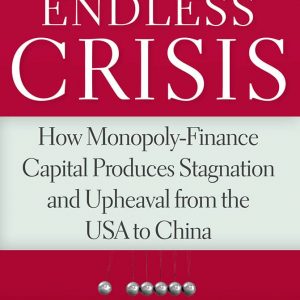Socialism & Democracy, Vol. 27, No. 2, July 2013
by Peter Seybold, Indiana University/Purdue University, Indianapolis
John Bellamy Foster and Robert W. McChesney, The Endless Crisis: How Monopoly-Finance Capital Produces Stagnation and Upheaval From the USA to China (New York: Monthly Review Press, 2012)
Since the Great Recession hit the US in late 2007 there have been competing understandings of the nature and causes of this devastating economic crisis. Mainstream economists have struggled to explain what caused it and what measures are necessary to revive the economy. As Paul Krugman noted in the New York Times Magazine, the majority of mainstream economists did not anticipate such a catastrophic event. Trapped by questionable assumptions, mathematical modeling, and ideological blinders, they neither foresaw the crisis nor could account for its magnitude. In fact, in 2003 Robert Lucas, then head of the American Economic Association, said, “The central problem of depression prevention has been solved.”
Since the Great Recession other mainstream economists have suggested that what happened was a rare and completely unpredictable event which fell outside the parameters of their models. Interestingly, as Foster and McChesney argue in The Endless Crisis, the work of John Kenneth Galbraith, Paul Krugman, Joseph Stightz, Nouriel Roubini, and New Yorker economics writer John Cassidy, has suggested a different account of the financialization of the economy and the potential for an economic crash. Orthodox economists marginalized these critics for having exposed the weaknesses of the dominant paradigm, which is only tenuously connected to the real world and is hostile to historical and theoretical understandings of capitalism.
In mainstream economics capitalism as a theoretical construct has been replaced by the free market economy, which has been declared the ultimate arbiter of public policy. It is little wonder that the very academic and business economists charged with developing a practical understanding of the economy went into shock when the Great Recession hit. In their world such an event was simply not theoretically possible. Into this breach step Foster and McChesney, continuing the
tradition of Monthly Review, with their analysis of the contradictions of monopoly-finance capital.
This book provides a clear explanation of why the Great Recession occurred and how the crash constituted a wide-scale failure that was entirely predictable. The authors reject the assumption that capitalism can always right itself by letting unfettered market forces reign. Their analysis is grounded in that developed by Baran and Sweezy in Monopoly Capital (1966), and later by Sweezy and Magdoff in the pages of Monthly Review and in subsequent books. The Endless Crisis is likewise an expansion of articles originally published in Monthly Review. The authors’ piercing assessment of mainstream economists and of the capitalist economy remains faithful to Sweezy and admirably extends the critique to the present period, an era marked by the hegemony of finance capital in a global capitalist system.
The book argues that to apprehend the dimensions of the Great Recession and to develop a theory of capitalist crises, one has to examine capitalism as a totality, including the contradictions inherent in a financialized economy. Adhering to Sweezy’s earlier arguments, the authors suggest that the present form of capitalism exhibits a “gravItational pull towards over accumulation and stagnation” which in the past may have been offset by military spending, the expansion of sales efforts, and the growth of financial speculation…
Read the entire review in Socialism & Democracy

Comments are closed.